Press-conference - The Vigil – Let's talk with Keith Thomas and Dave Davis
By Mulder, Zoom Event, 19 february 2021
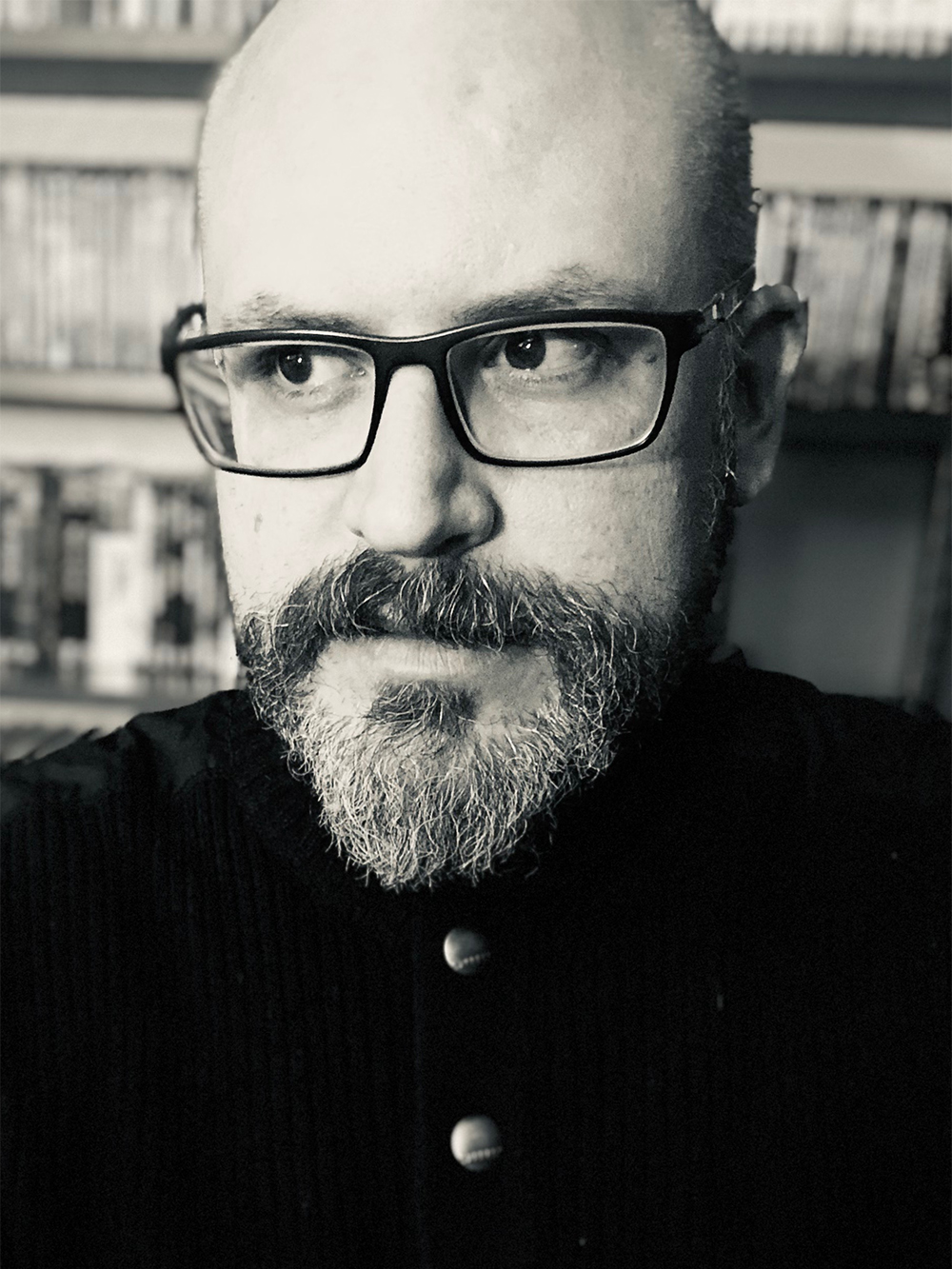
Steeped in ancient Jewish lore and demonology, The Vigil is a supernatural horror film set over the course of a single evening in Brooklyn's Hasidic Borough Park neighborhood. Low on funds and having recently left his insular religious community, Yakov reluctantly accepts an offer from his former rabbi and confidante to take on the responsibility of an overnight "shomer," fulfilling the Jewish practice of watching over the body of a deceased community member. Shortly after arriving at the recently departed's dilapidated house to sit the vigil, Yakov begins to realize that something is very, very wrong. On the occasion of the US release of this film on February 26th, we had the opportunity to attend a press conference in the presence of the director and screenwriter Keith Thomas and the main actor Dave Davis.
Q : all right Dave, Keith thanks so much for taking the time to chat with us today. So Keith you know we're so familiar with seeing religious horror movies take on the myths of like Christian stories and catholic stories and obviously this is not that. So i was curious if when you were approaching like the visual style and the visual language of the movie if there were things that you aimed to distinguish yourself from those typical like Christian catholic myths that we typically see of demons and whatnot ?
Keith Thomas : i think in some ways yes and in other ways no. I really did kind of approach it as it was going to be a horror film through a Jewish lens in terms of like the community we're in and the language and the mythology and the kind of all that stuff but i wanted it to feel like a horror film and kind of have the sort of tropes that you might expect as kind of an easy entry into it. So for me in some ways it was me thinking okay it's a chance to do like a Jewish exorcist and kind of so a lot of the visual kind of style. They both came from me being influenced by certain things you know. There's some films you see at a certain age that just kind of lodge themselves in your brain and for me it was stuff like Angel heart and it was stuff like Jacob's ladder and it was just a certain aesthetic and a feel and a look to those films that i wanted to replicate in some ways that i also thought would be true to this is a religious horror film it just happens to be Jewish but it's going to have that sort of atmosphere.
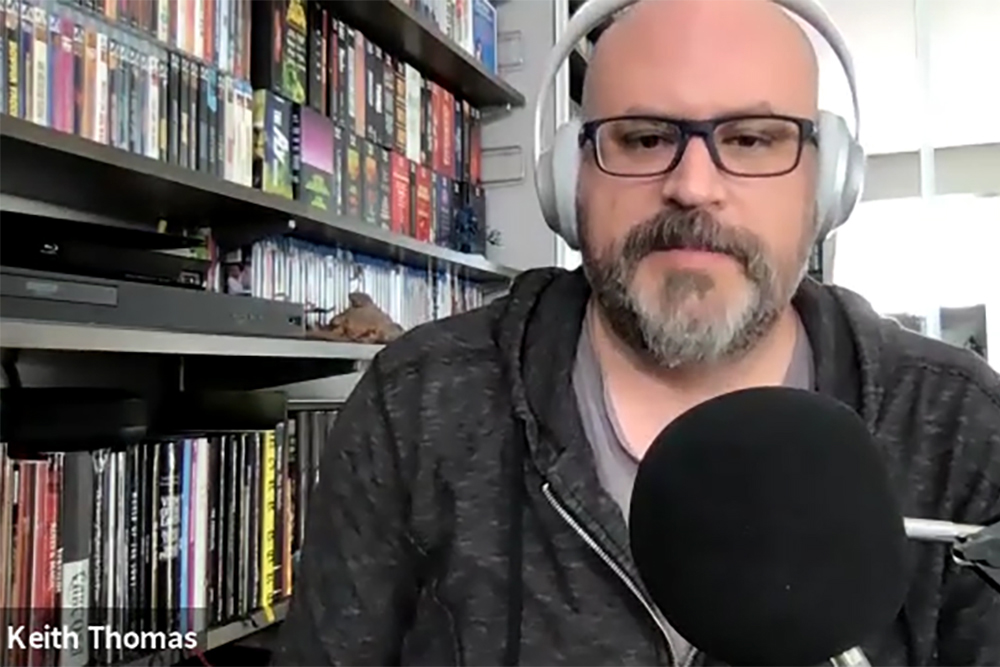
Q : I know you wanted to do this the proper way actually with permits and you know you were out there you know shooting it like a regular film and not gorilla style. Can you talk about the cooperation from the community and also if you can talk about the house the location not the location but the house well you know that if that was a real house ?
Keith Thomas : So yes. It was important to me for the film to feel you know cinematically like what I was going for in terms of the aesthetics of I wanted a lot of dolly shots i wanted Steadicam i wanted it to have that omniscient sort of that view that that's very cinematic and so that meant putting a dolly track down a street in Williamsburg in the community so it meant having a real presence there and you know the community well I think most of all they were just really curious. It wasn't so much that they cared about the movie we're making but it wasn't like they were offended like oh this could be a Jewish horror film or whatever this was it was more just like why are you filming here like what why are you here why are you bothering it's 2 30 in the morning we're filming a lot of it and Dave could talk about some of those scenes and in terms of the house it was a real house. It was important to me we talked about building a set and obviously you can float walls on a set and it's easier to move the camera around but there's a certain kind of feel in a in a house that has a history where there's something baked into the walls and that house that we filmed in belonged to one of our executive producers who had bought it and we was going to remodel it and we just luckily got in before but it had belonged to an elderly Jewish woman who had died at the house a few months before we moved into it and so there was something just there that you could feel and sense it made it harder we had to make build trolley tracks in you know very tight spaces and we're all piled up on each other but it really added a lot of authenticity to it.
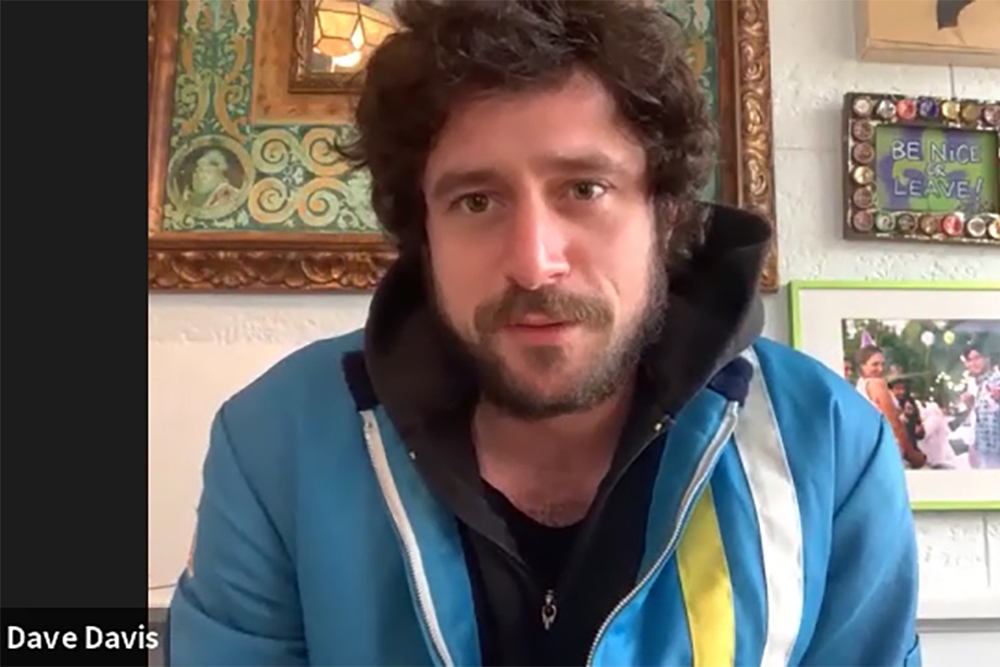
Q : Hello Dave, hello Keith, i have discovered your movie few months ago and for literally good and scary. What can you tell us about your collaboration with Jason Bloom ?
Keith Thomas : oh sure so the film itself was made independently and it was something that we kind of that we made with boulder light productions and angry atom productions and it was right entirely independently financed and filmed in New York i think when we were making it we had kind of no idea what would come of it and kind of where it would go and we were lucky enough to get it into the Toronto international film festival where it had its premiere and it was shortly after that Blumhouse had seen the film and so they saw it there after TIFF and were big fans of it and so that's how that's how we kind of met them and with for myself in particular started working with them.
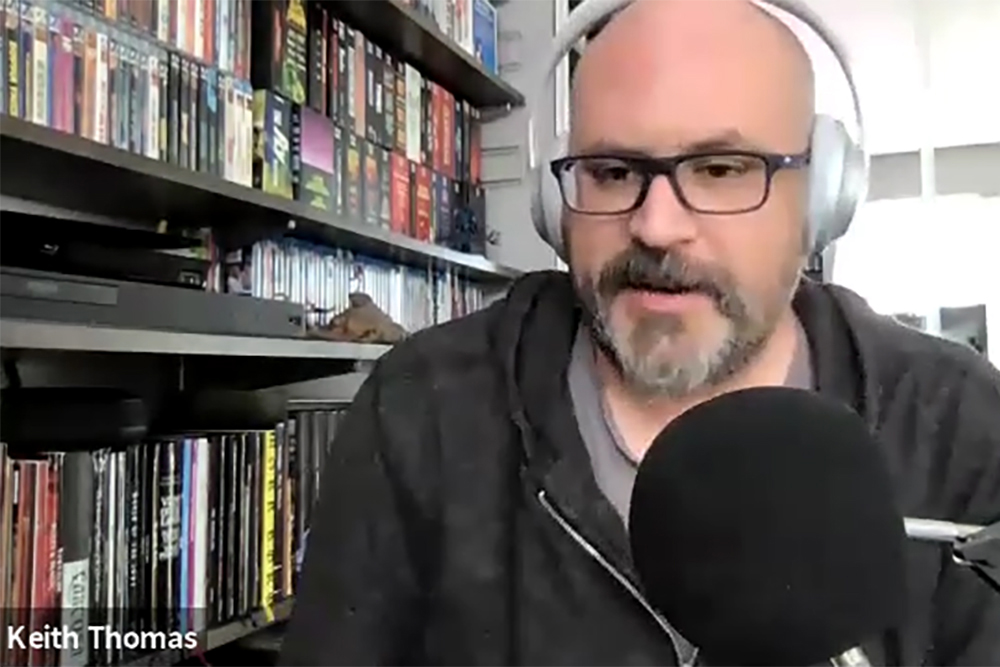
Q: Hello Dave your character is quite emotional and troubled where did you draw from for hat
Dave Davis : well you know to build the character of Yakov i wanted to first understand the community that he came from and so i spent a lot of time researching the hasidic community and meeting a lot of people who had one foot in or out of the community in various stages of belonging to the community or having left the community or trying to leave the community and the struggles that entails and then as well you know Yakov is going through the sorts of traumas that i think many people go through myself included so in that way i just tried to delve into the loneliness associated with giving up a life to find a new life and to really understand the courage that Yaakov needed to take such a bold step to take the journey of discovering who he was and that was a journey that Yakov was on and that a journey that I had to undertake to understand who Yakov was and you know when we were filming I spent a lot of time alone in the apartment I was staying in which was sort of sparsely furnished and that gave me the space I needed to work on my dialect and on the role and study the script but also to just sort of sit in that loneliness and try to understand what Yakov was going through I think a lot of times when people find themselves alone they seek to fill that silence with music or television or films they distract themselves in one way or another and here Yakov is in this house surrounded by you know his demons and surrounded by his community and the things he needs to confront the ticking of the clock grinding at his ears and so I tried to really live in that sort of loneliness to understand you know what does someone hear when there's nothing to hear you know what does the ticking of that clock mean to you when you know as an actor when you don't have another actor to work with and all the time you were forced to listen to ourselves and to our surroundings and I tried to really not run from those fears that defined me as a person but encouraged them and foster them and used them for Keith's film.
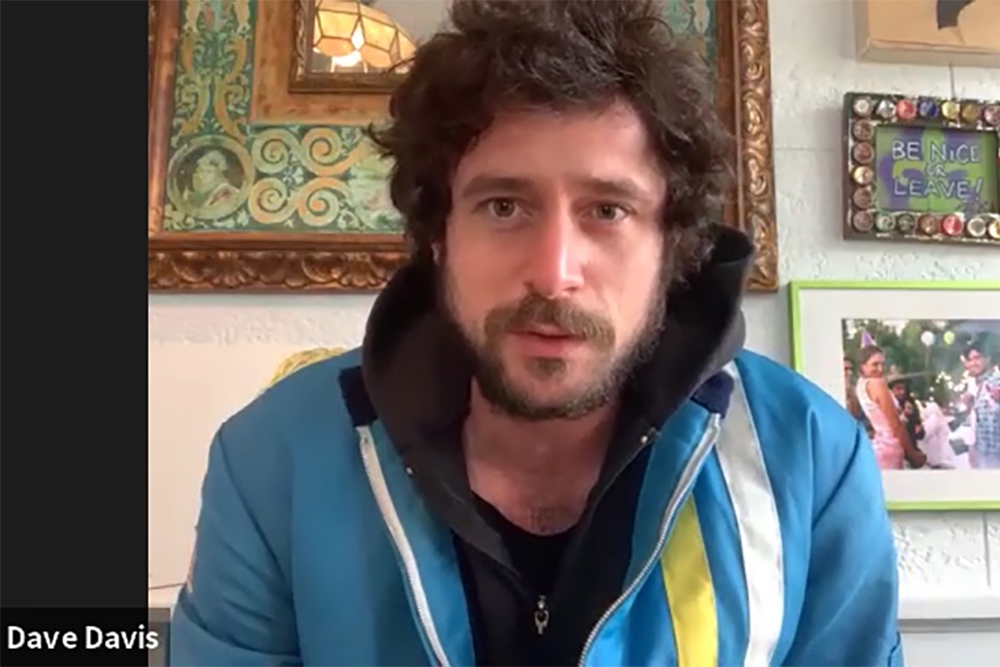
Q : i also wanted to ask you both about creating the physicality for the character and what that experience was like of maybe doing the action sequences and really creating the stunts for the film as well ?
Keith Thomas : I can talk about you know it's interesting when I wrote the script and we had these sequences that are going to involve a lot of physical sort of action. It was one thing to write them and be like hey i got to really push it I’m going to make this this is going to be in my head i was like this guy's going through a ton of emotional torment but also this kind of physic it's this physical manifestation of it and it's one thing to write it and it's of course another thing to actually act it out. In particular there's a sequence where Yakov leaves the apartment and has a very sort of physical encounter on the sidewalk and you know. We had been prepping for that I think that was the last thing we shot and we were prepping for that for a long time and a part of it was just getting ready for the just the physicality of it in particular it was freezing it was freezing it was the middle of the night and it was really Dave both figuratively throwing himself into this performance and literally throwing himself into the
Performance. Dave you can talk about kind of how grueling that was.
Dave Dais : well you know it's funny because it was the last thing that we filmed but also the first night that i was in New York I came to the set to meet up with Keith and our cinematographer and they were walking through that section so we had a chance to really talk about it and if I remember correctly in the script it talks a lot about Yakov's hands cramping up and being the first thing to kind of take hold but then we started talking about well how does the rest of Yakov’s body fail and over the course of the next month and a half I mean we talked about it exhaustively of at which moments exactly do different parts of Yakov fall apart and we came up with the idea that if Yakov's hands are not functioning then when his body fails and he hits the ground he would actually end up in an attempt to catch himself end up punching the concrete and so that became really important to me and we figured out that okay when Yakov needs to have his hand wrapped and be bloodied and all the scenes that follow after that so luckily we had really sort of thought that out and Keith and i had really talked about it a lot so that we were able to keep the continuity going even though we were filming really out of order and you know as far as the characterization of the movement of the character I just tried to meet as many people as I could and watch as many people on the street and try to understand how people hold themselves how people walk i think at a couple points I took hands behind the back which is something I’d seen a lot of people in the community do and just really trying to absorb as much as possible to bring as much authenticity as possible to the character.
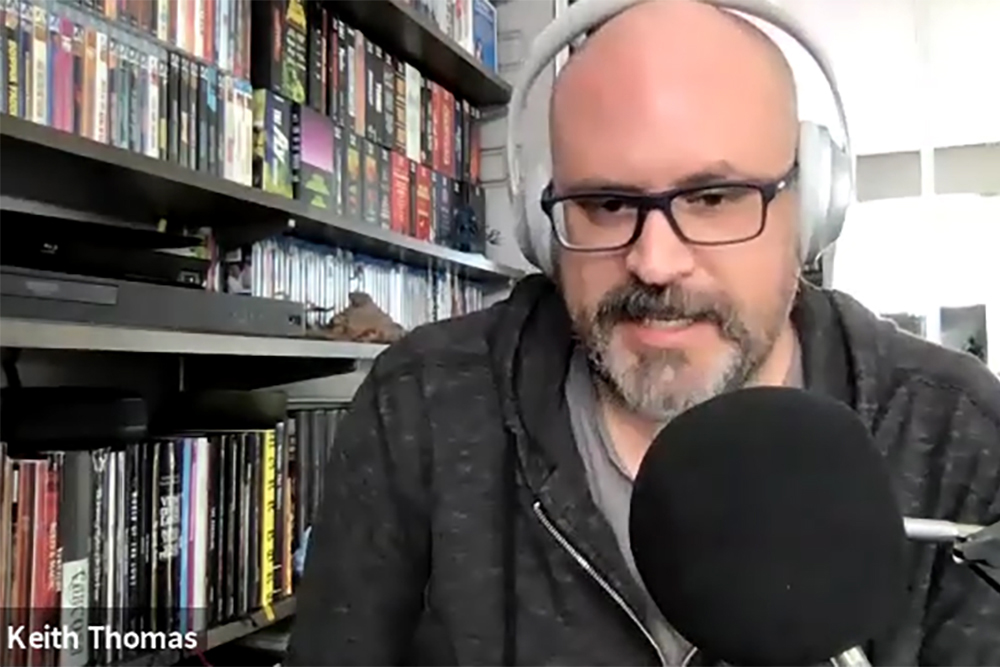
Q : thank you gentlemen Keith and David. Keith first off in an age where we see so many Marvel movies that are about a hero's journey, The vigil is about a spiritual journey how tough was it for you to craft that in such a way that it has a very universal appeal especially when you're shooting that and telling a story within the Hasidic community and for you Dave in going through the process even though the film was shot out of sequence given the nature of the film when you had finished it and finally seen it because it's such an epic quest of the soul did you find yourself changed in any beliefs or thoughts you might have had personally
Keith Thomas : I’ll say that in terms of like the writing of it it was i wanted it to be universal you know it was one of those things where when i was describing it was always a horror film through a Jewish lens it was a horror film first so the big piece of it was this sort of you know the concept of a dark night of the soul of confronting something in this case like this very personal sort of demon that's manifest and i felt like that's universal that that regardless of the Jewish lens the regardless of the Yiddish and the kind of the Hebrew prayers and some of the ritual aspects of it that it was important that the core of what's happening to Yakov a man who's struggling to face both guilt for something that happened in his past that he's having trouble getting over but also it kind of inherited trauma in a community in a neighborhood in a family and then an individual and how i think that's a universal thing that's something that everybody faces for me it was very interesting to kind of explore how something so short of a time frame something that's maybe 20 seconds long can send ripple effects through the rest of your life that not only can you really never get over but the key to overcoming them so to speak was to learn to live with them and that was the position that Yakov was in that again it was like this is a yes a spiritual psychological sort of thing that I feel like is very universal even though we're telling it through the framework of this particular faith in this particular community
Dave Davis: yeah and you know I’m definitely the type of person who considers himself a realist and you know a friend might come to me and say oh yeah there's a ghost in my house and I’ll go okay yeah sure is there a ghost in your house or you're having some electrical problems or something like that but I think the truth is that you know magical things happen all around us all the time and I felt it necessary to invoke some of these magical creatures that exist in our world to get through the filming of this project to make this film you know everything it could be I felt it necessary to believe that and so did it change me over time I think so because you can't invoke magic when you need it and then pretend it's not there when you don't need it so the fact that you know anyone who is on that set will tell you there was a very special energy going around and you know did we know that The vigil would turn into what it was going to be no but I can tell you that when that many people get together with a common goal and everyone is focused and everyone feels the importance and the gravity of what we're trying to accomplish you know that something spectacular is happening and there was magic on that set so you know Yakov's faith people ask well what does he feel at the end and I wouldn't deign to put words to that but i think that people struggle with understanding their faith and people struggle with understanding their faith within the context of their family or their community or their parents belief and it's up to all of us to sort of figure out how we feel about that and as Dave Davis the actor I’ll tell you that i left the vigil far more accepting of the things we can't see in the world .
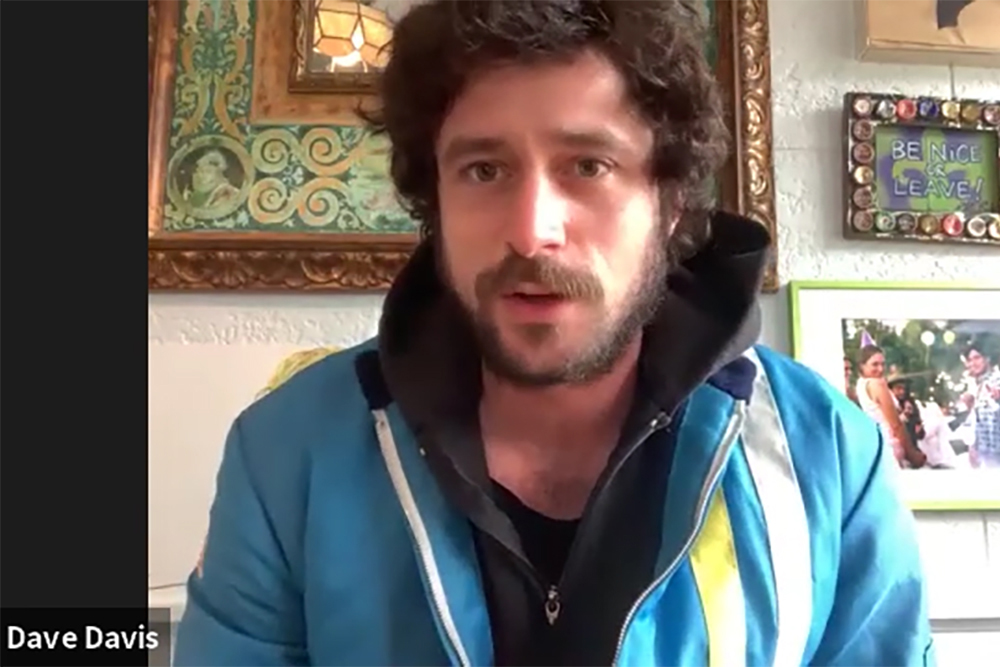
Q : I think most of us can agree that one of the most uncomfortable moments in the film is Dave when your character replies to a text message with okay period because that's totally believable for your character but it's you know egregious in the real-world so I wonder Dave you know after all the research you did among the community were there other more drastic changes or pieces of advice that you made to the script in collaborating with Keith or various moments here and there ?
Dave Davis : absolutely I mean, you know the script was so beautiful and it had so much depth in it and as we kept exploring we kept learning new things and I would come to Keith and say look at this great phrase i heard or look at this great characterization or what do you think of this and Keith was always very open i like that i don't like this or why is that important this would work perfectly in this scene versus another and I think we really had a lot of fun keeping it in flux and continuing to play with a lot of those things .
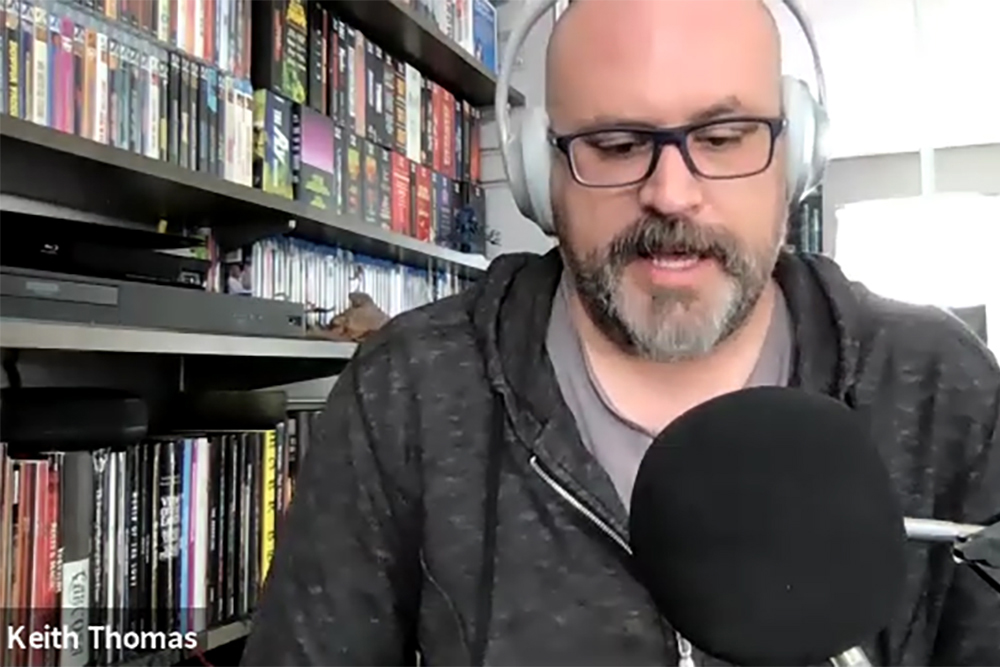
Q : this is a question for either one of you. What does your film. do for the business and the image of the shomers ?
Keith Thomas : Dave you want to take that
Dave Davis : I’ve already had several job offers [Laughter].
Keith Thomas : I know i think it's interesting because it it shines a light in some ways on something this this watchman sort of role that i don't think people are that familiar with in the Jewish community it's relatively common in the sense that when someone passes away there's somebody watching the body and it is typically a family member a friend. What's interesting to me is that in this community in the more ultra-orthodox communities there are people who are paid schomers the paid watchmen so that was always fascinating like you know and i read interviews and you know heard interviews with folks who had done this so it's interesting that it's in some ways shining a light on something I think not many people are familiar with but isn't relatively that uncommon.
Q : hello Dave which scene in this film was the most difficult for you to play and why ?
Dave Davis : wow that's i mean it's tricky because they're this is the most difficult performance I’ve ever had the pleasure of undertaking it was a challenge as a character study and as a performance piece and then it had the added difficulty of the multiple languages. So, there were many challenges on set and the physical challenges but I think for me the most difficult was the emotional toll it was finding the sorrow and the fear that Yakov was living inside of, bringing it to the point of feeling like I was almost in personal danger of losing it and then attempting to keep myself at that point until Keith was ready to film the scene that i thought that emotion needed to be there for and so as a result you know there were moments of great catharsis at yelling of cut and okay i think we got it it was like okay I can let go of that feeling for a little while but living in that sort of pain it was a prolonged experience and it was a challenge but it was so rewarding also you know in some of the more climactic scenes the addition of the prayer and the layering of that emotion over top of traditional prayers was an extra challenge and actually reminded me of my Shakespeare days a little bit because you know i was taught that the words are just the vehicle for the emotion and in some ways these Jewish prayers that I’ve grown up hearing my whole life became the matrix to put all of this work that Keith and I had been doing for months building this character and this emotion and the story it became the framework that I could lay that on top of so that that was an interesting challenge to use these words that I’ve heard so many times and turn them into something new a new experience and that we can all go on with Yakov.
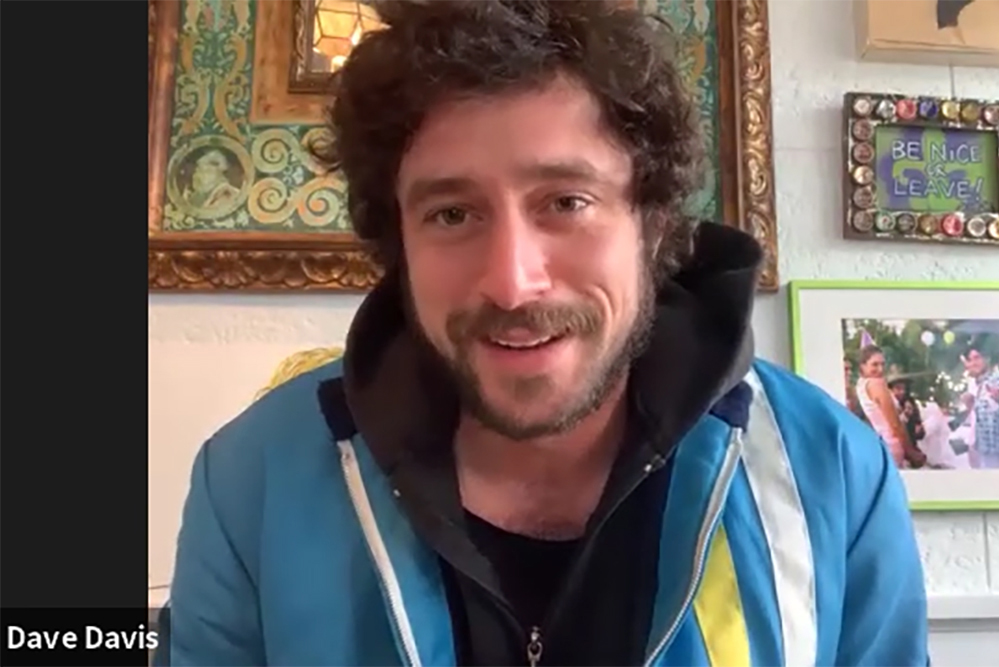
Q : Can you can explain the creature design behind the demon and any changes that you made versus the Mythology ?
Keith Thomas : sure so the sort of the demon at the center of this film is a real demon in the sense that it exists in ancient Jewish writings and it's called a Masik which means destroyer in Hebrew in the text that i kind of dug up looking for the mosaic and kind of figuring out what this thing would be it all it says is that you should not go into abandoned houses because there could be a Masik in them and you don't want to run into one of those. There's no description of what it looked like so when it came time to actually make the thing it was important to me that it not just be your standard sort of boogeyman just like some things you know with whatever standing in the shadows that it had some sort of connection to the themes of the film so for me if a big part of the film was trauma and whether to let go of the past and how to move on then this thing should be the embodiment of always looking backwards of never looking forward of never moving on and so that became part of the design and it was like well how do you make that physically if you're always looking into the past what would that physically look like what would that do to a human body and so you know kind of that's how the design of the thing came about and the other trick of course is with any horror film is you know how much do you show what do you show it's scarier of course when people are envisioning what the thing is and they're only getting glimpses of it so it was you know both designing for the big reveal because of course you have to show the thing eventually but at the same time keeping it ambiguous and vague enough that it that the audience could cut it right onto the thing in terms of their own experience in terms of what they think they're seeing fantastic although.
Dave Davis : I will add to that though that i hadn't seen it at all I had this imagination of it and then when i showed up on set on one day when I was able to see what Keith and the team had been working on and I got the first glimpse of it was terrifying so sometimes actually getting able to see it is terrifying also.
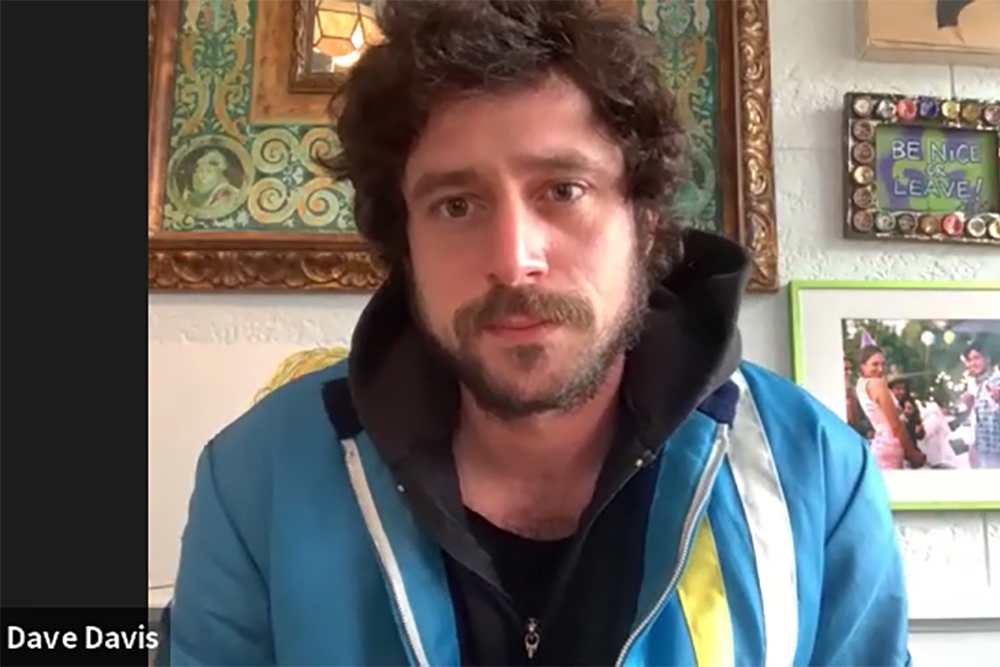
Q : even though like the majority of the film is with your character do you by himself or with limited contact with people. I want to ask about the scenes where he did have interactions with the other characters but that experience was like of collaborating with the rest of the cast on set as well ?
Dave Davis : well i mean you know it really was a wonderful ensemble in this film we had a lot of actors who were previously or continued to be members of the community with varying levels of acting experience and they were such an amazing resource as well as just wonderful performers and you know the naturalism that they brought to this world that is a world that they belong to in some ways was really a treat and a pleasure as an actor who's you know i don't want to say pretending you know i like to think I’m bringing more to it than that but you know at the end of the day let's be honest an actor pretends and you know so to be around people who didn't need to pretend that much you didn't need to do as much research as I did who were living it that was really a very special experience and a pleasure to do those scenes as well as working with the wonderful on late Lynn Cohen who was a spectacular actor and I mean she just instantly elevates any scene she's in and as she was fond of saying them the most important actor in any scene is the other actor and I really took that to heart with her because she would say you're the most important in this scene i go, no you're the most important in the scene you know that's really a valuable lesson that I’ll keep forever so there were a lot of really wonderful people to play against as well as the doctor character who a lot of people don't know was originally played by Keith which i really enjoyed acting opposite of great thinking.
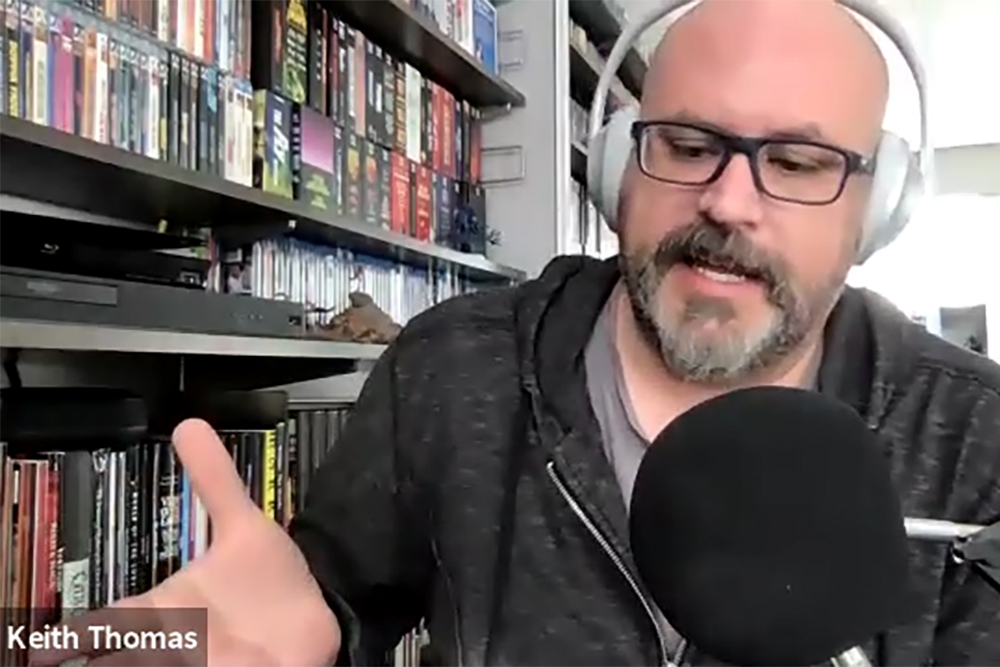
Q : i wanted to ask i grew up in a melting pot of a neighborhood that was Jewish Italian and German and there was a Jewish couple that had kind of adopted me and when the gentleman found out that I liked horror stories he gave me a copy of a book by Isaac Bashevis Singer who's an award-winning Jewish author but here was a collection of horror stories demon stories, ghost stories that people don't normally associate with him so i was wondering how did you go about finding this story and the demon that you just mentioned and i think what's really brilliant is the fact that with this film is with a whole bunch of other filmmakers these days are telling stories that come from different ethnicities and different cultures which is a big change over what we've usually come to expect for the horror genre and so you know also i wanted to say thank you very much for telling this type of story
Keith Thomas : thank you so much. i I also have noticed that and it's exciting that that sort of thing is going on in terms of i knew it wasn't i didn't want to tell a story of somebody from outside the community coming into the community and saying uh hey you got a problem here there's this demon on the loose and you've got to solve it you know that sort of that traditional kind of narrative that we're used to i wanted to see it from inside the community and if we're going to go into the community it's got to be you know with from that perspective you know and from those characters you know the story it's interesting because in Jewish i think the there's a lot of assumption that there's not that much superstition in Judaism particularly again you know in the more secular world it's just it's not a common thing there isn't a hell the same way there is in Christianity there isn't a devil in in the same way in terms of somebody taking souls and sending out demons it exists in a different mythology but it exists and it's it was a lot of fun to kind of explore it particularly in this community where you know there are some superstitions that are more solid and kind of more widely held than others and it just felt fresh it just felt different it was like you know finding this this the Masik, this demon it wasn't a dybbuk which we've seen before and they've seen movies with dybbuks and it wasn't a gollum which was also seen it just felt like it was something new, something different and so it was exciting to kind of to dig into that it was both personal being Jewish and kind of uncovering stuff that I didn't even know about before myself it was kind of like discovering a personal history and a kind of relationship with these stories that are not widely first of all they're not widely translated into english but second of all there's not widely told people just don't know that much about them so it felt like the vigil was a nice opportunity to kind of expose people to a different mythology than their than there might be used too.
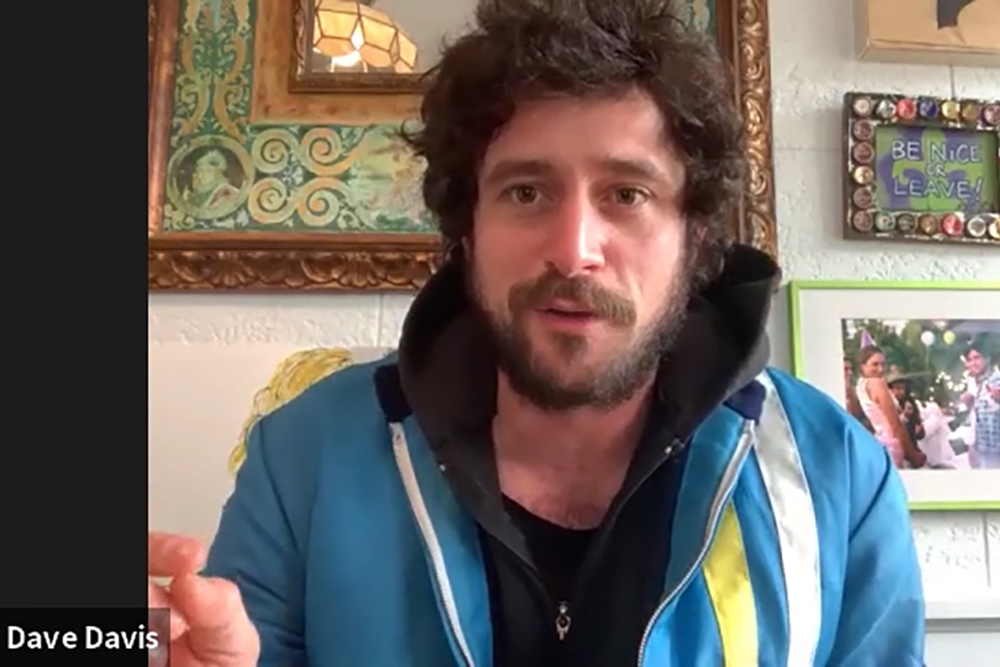
You can read our review here
Synopsis :
New York, Brooklyn. After leaving the Orthodox Jewish community, Yakov, short of money as well as faith, reluctantly agrees to provide a wake for a deceased member of this religious group. With the deceased's remains as his only company, he soon finds himself confronted with increasingly worrying phenomena...
The Vigil
Written and directed by Keith Thomas
Produced by Raphael Margules, J.D. Lifshitz, Adam Margules
Starring Dave Davis, Menashe Lustig, Malky Goldman, Fred Melamed, Lynn Cohen
Music by Michael Yezerski
Cinematography : Zach Kuperstein
Edited by Brett W. Bachman
Production company : Blumhouse Productions, Boulderlight Pictures, Angry Adam Productions
Distributed by IFC Midnight
Release date : September 2019 (TIFF), August 5, 2020 (International), February 26, 2021 (United States)
Running time : 89 minutes
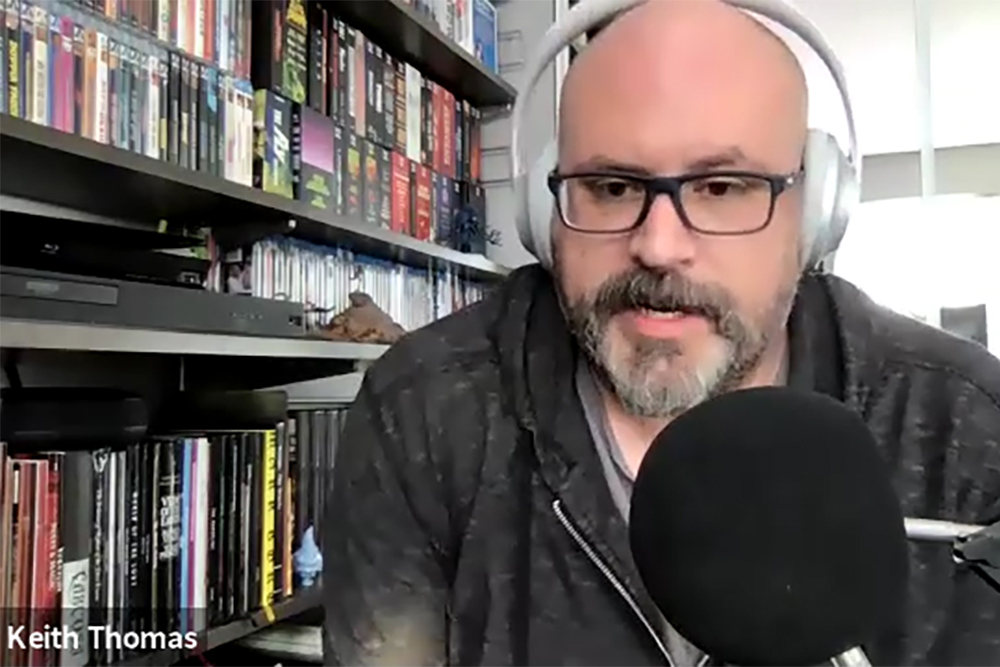
We would like to thank Ivy Martinez for inviting us to this virtual press conference and Keith Thomas and Dave Davis for answering our questions.

